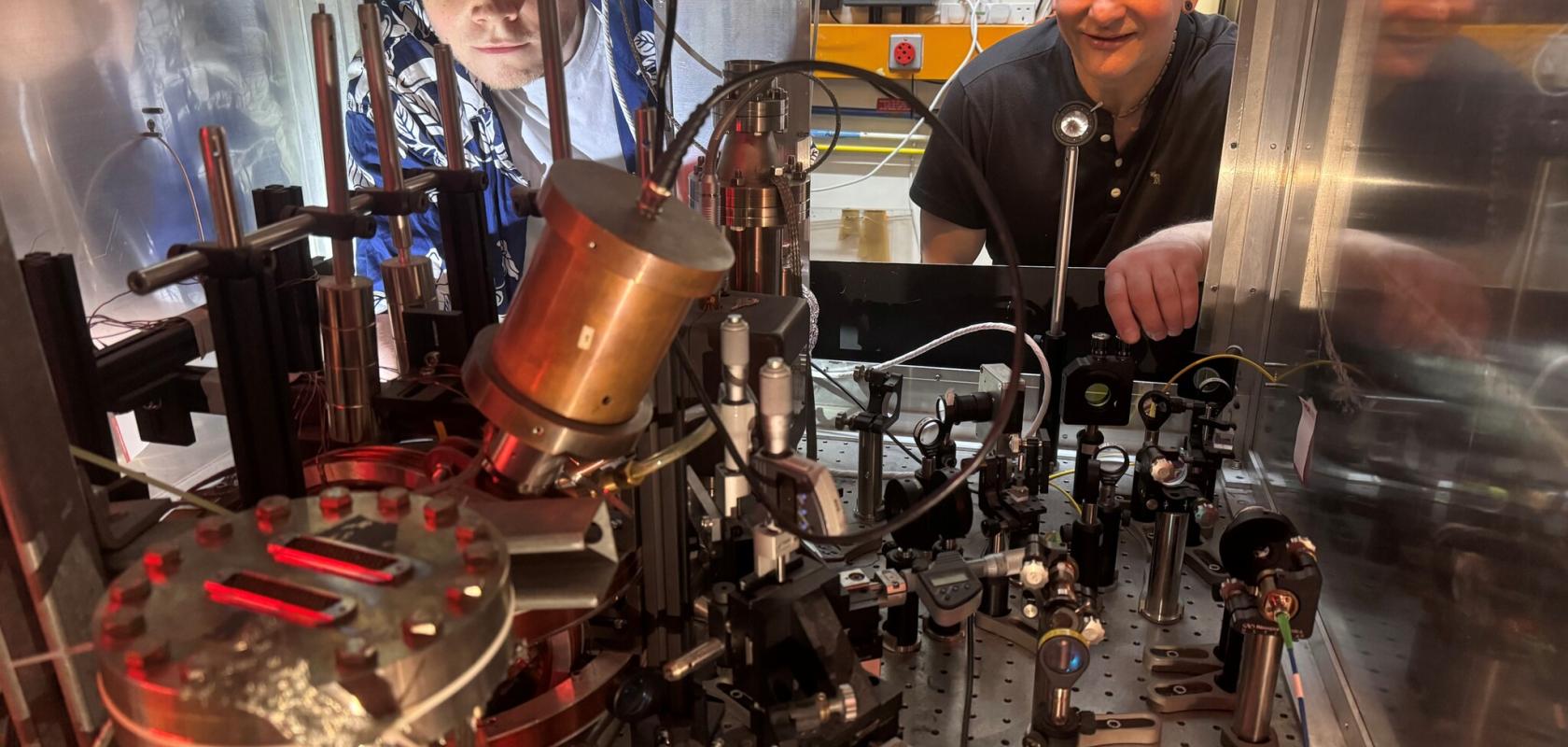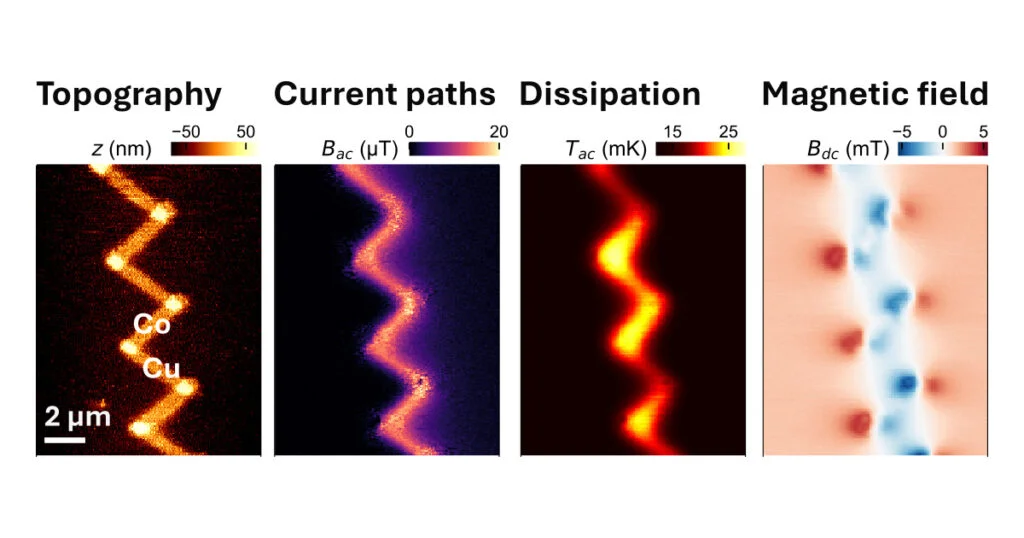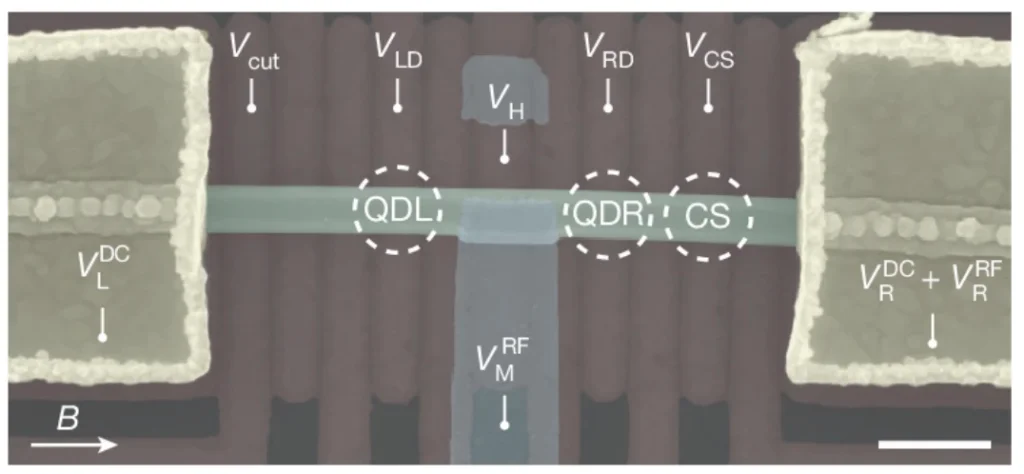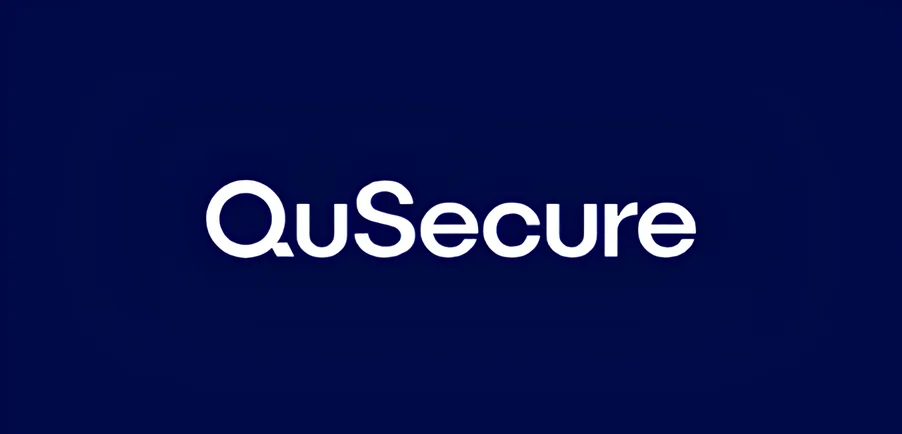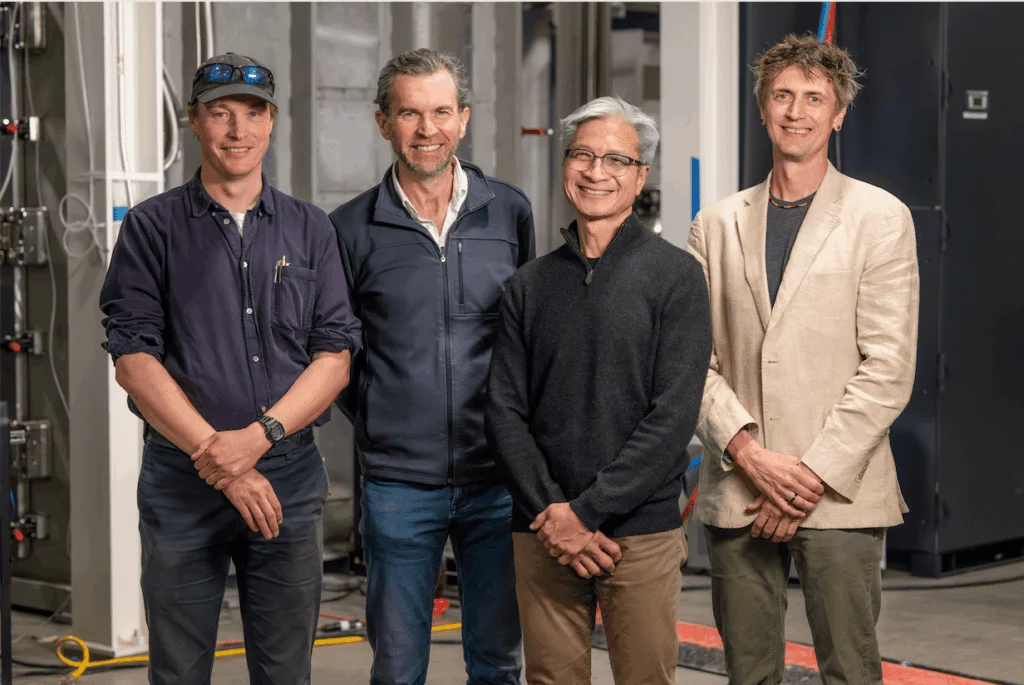Insider Brief
- Quantum researchers at the University of Sussex have developed the world’s most sensitive method for detecting electric fields, improving previous benchmarks by a factor of 100.
- The technique uses a single charged atom in a superposition state to detect low-frequency electric fields, with potential applications in brain imaging, defense, communications, and geological exploration.
- Originally created to identify and eliminate noise in quantum computers, the technology could eventually enable breakthroughs in mental health treatments, epilepsy monitoring, and next-generation quantum sensors.
- Falk Bonus and Winfried Hensinger with the trapped-ion quantum sensor capable of measuring electric fields with unprecedented accuracy. (University of Sussex)
PRESS RELEASE — A powerful world record-beating technique to detect tiny electrical fields 100-times more effectively than currently possible, offering ‘exciting’ potential for healthcare and defence applications, has been discovered by quantum computing experts at the University of Sussex.
In new research published today (Wednesday June 11 2025) in Nature Physics, Sussex researchers have found the most sensitive way to detect electric fields in the world, which has been hailed as having the potential to revolutionise brain scanning – including in the treatment of depression and epilepsy – as well as microscopy, underwater detection and communications, and geological prospecting.
Using a single charged atom held inside a vacuum system, coupled with a measurement technique invented by the university’s quantum computing team, the discovery has broken the previous record by two orders of magnitude.

This means the technique is around 100 times more powerful than was previously possible, although the discovery has the potential to better the previous record by six orders of magnitude – making it one million times more powerful.
Professor Winfried Hensinger, director of the Sussex Centre for Quantum Technologies which made the discovery, said: “We have built a machine that makes use of single charged atoms (ions), capable of unprecedented measurement capability.
“We have managed to tame some of the very strange phenomena of quantum physics to create a device that can detect low frequency electric fields with unprecedented sensitivity.
“Indeed, the working principle of the device relies on the atom to be in a superposition, meaning the ion is in two states simultaneously, an effect that is ruled out by classical physics.
“And we recently developed a microchip that could enhance this sensitivity even further by yet another 10,000 times. Using a different ion species with such a chip could enhance sensitivity indeed by a million times.”
The discovery’s potential use in brain scanning was hailed by James Stone, Professor of Psychiatry at Brighton and Sussex Medical School, who is currently researching the use of brain imaging neurofeedback as a treatment for people with depression.
He said: “It is an exciting discovery – with development it could open the way for much less intrusive and more detailed 3D imaging of electrical activity in brain, giving the potential to detect which parts of the brain are active in real-time, and potentially giving insights into how thoughts and sensations are represented in the brain.
“It could potentially lead to huge breakthroughs in our understanding of consciousness, as well as of mental illness, and may even be useful in neurofeedback treatments for mental health conditions such as OCD or depression by allowing people to visualise their brain activity and respond directly to it.
“It could also be useful in neurological conditions such as epilepsy – detecting regions of abnormal activity in deeper brain regions than would be possible with existing EEG methods.”
Quantum computers are machines that could, in principle, solve problems that would take modern supercomputers billions of years to solve, changing the way we work and live. However, electric field noise that is present all around us can limit the performance of quantum computers.
In order to construct quantum computers with world-record specifications, researchers from the University of Sussex developed a technique to detect such fields with unprecedented sensitivity. After finding the sources of noise, they can then eliminate them to enable the construction of the world’s most powerful quantum computers.
While their technique is a highly promising development for quantum computing, the measurement device they have developed will have applications in many other industry sectors where the detection of tiny electric fields can be used for important real-world applications.
They include communicating under water, the detection of submarines, or geological prospecting techniques, helping in the search of sub-surface raw materials and mineral deposits.
As well as brain scanning, the findings are also likely to be able to improve microscopy, allowing better and more accurate analysis of samples in the world of healthcare.
Professor Hensinger said: “This is an excellent example of a path basic research often takes. We developed a powerful tool to reduce errors in trapped ion quantum computers, and as a direct result of that effort we now have a novel quantum sensing capability.
“The detection of electric fields has numerous applications ranging from defense to healthcare, and the potential for us exploit this quantum sensing approach across multiple disciplines in the near future opens a host of exciting possibilities.”
The research was carried out at the Sussex Centre for Quantum Technologies, which is a Centre of Excellence based at the University of Sussex drawing together world-leading experts and innovative approaches, creating a critical mass of knowledge, skills and training.
Professor Sasha Roseneil, Vice-Chancellor of the University of Sussex, said: “It is great to see Sussex researchers make yet another critical quantum computing breakthrough, which also carries real-world applications across society.
“The University of Sussex is investing significantly in quantum computing to support our world leading researchers, whose work has the potential for enormous positive impact on the lives and well-being of people across the world. Alongside our ongoing research, the University’s spin-out company Universal Quantum, which is dedicated to the development of utility-scale quantum computers, has already attracted around £100 million in funding.
“The University of Sussex and the greater Brighton area have a plan to create a ‘Quantum Valley’ in Sussex, with the University acting as a catalyst. The University has one of the most comprehensive high level training programmes in the world, which includes a four-year quantum technology undergraduate degree and the UK’s first quantum technology online distance learning degree. We look forward to contributing to the economic growth of our region and of the whole country through further developments in quantum research at the University in the future.”

